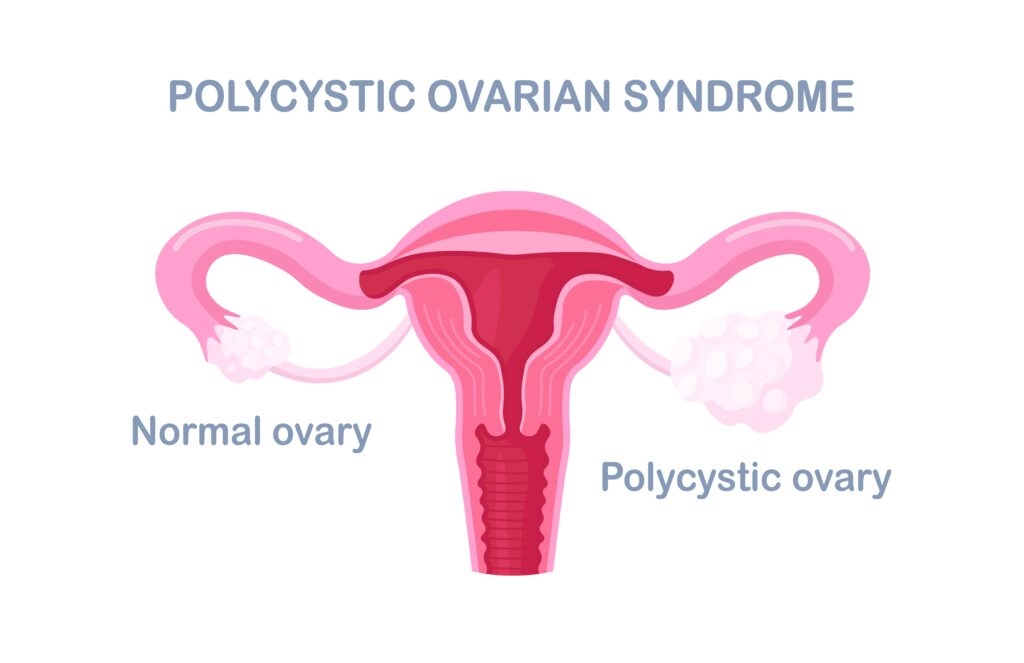Polycystic Ovary Syndrome (PCOS) is a common endocrine disorder affecting women of reproductive age. Despite its prevalence, many women are unaware of its symptoms, causes, and available treatments. This article aims to provide a comprehensive understanding of PCOS, helping women recognize and manage this condition effectively.
Interesting Facts about PCOS:
-
While PCOS is often associated with obesity, it can affect women of all body types. Even women with a normal weight can have PCOS and experience its symptoms.
-
Symptoms of PCOS can appear soon after a woman’s first menstrual period, but they can also develop later during reproductive years.
-
PCOS is linked to higher rates of depression, anxiety, and eating disorders, highlighting the need for comprehensive care that addresses both physical and mental health.
What is PCOS?
Polycystic Ovary Syndrome (PCOS) is a hormonal disorder characterized by the presence of multiple cysts in the ovaries, irregular menstrual cycles, and elevated levels of male hormones (androgens). It can lead to a variety of symptoms and long-term health issues if not properly managed.
Symptoms of PCOS
The symptoms of PCOS can vary widely among women. Common signs include:
-
Irregular Periods: Women with PCOS often experience infrequent, irregular, or prolonged menstrual cycles. Some may have fewer than nine periods a year or heavy menstrual bleeding.
-
Excess Androgen: Elevated levels of male hormones can cause physical signs such as excess facial and body hair (hirsutism), severe acne, and male-pattern baldness.
-
Polycystic Ovaries: The ovaries may be enlarged and contain numerous small cysts. This can be detected through an ultrasound.
-
Weight Gain: Many women with PCOS struggle with weight gain or find it difficult to lose weight.
-
Thinning Hair: Hair on the scalp may become thinner and fall out.
-
Skin Issues: Acne, oily skin, and darkening of the skin, particularly around the neck, groin, and under the breasts.
Causes of PCOS
Several factors are believed to contribute to PCOS:
-
Insulin Resistance: Many women with PCOS have insulin resistance, which means their bodies are less effective at using insulin. This can lead to higher insulin levels, which may increase androgen production and cause symptoms of PCOS.
-
Hormonal Imbalance: Elevated levels of androgens can interfere with the ovaries' ability to release eggs, leading to irregular menstrual cycles.
-
Genetics: PCOS often runs in families, suggesting a genetic predisposition.
-
Inflammation: Low-grade inflammation has been linked to higher androgen levels in women with PCOS.
Long-term Complications of PCOS
If left untreated, PCOS can lead to several serious health issues, including:
-
Infertility: Irregular ovulation can make it difficult to conceive.
-
Type 2 Diabetes: Insulin resistance increases the risk of developing type 2 diabetes.
-
Metabolic Syndrome: This includes a cluster of conditions such as high blood pressure, high blood sugar, and abnormal cholesterol levels, increasing the risk of heart disease.
-
Sleep Apnea:Women with PCOS are at an increased risk of sleep apnea, a condition that causes interrupted breathing during sleep and can lead to poor sleep quality and fatigue.
-
Endometrial Cancer: Irregular periods can lead to the thickening of the uterine lining, increasing cancer risk.
Treatments for PCOS
While there is no cure for PCOS, several treatments can help manage its symptoms and reduce the risk of complications:
1. Lifestyle Changes:
-
Healthy Diet: Focus on a balanced diet rich in whole foods, high-fiber vegetables, lean proteins, and anti-inflammatory foods. Avoid processed foods and sugary snacks.
-
Regular Exercise: Physical activity helps lower blood sugar levels, improves insulin sensitivity, and aids in weight management.
-
Weight Management: Losing even a small amount of weight can improve symptoms and increase the effectiveness of medications.
2. Regular Health Check-Ups:
-
Regular monitoring of blood pressure, glucose levels, and cholesterol can help manage and prevent complications. Working closely with a healthcare provider is essential to develop a personalized treatment plan.
FAQs about PCOS
Q: Is PCOS a common condition?
A: Yes, PCOS affects 1 in 10 women of reproductive age.
Q: Can I get pregnant if I have PCOS?
A: Yes, many women with PCOS can conceive with the help of fertility treatments and lifestyle changes.
Q: Does PCOS only affect overweight women?
A: No, PCOS can affect women of all body types, although it is more common in overweight and obese women.



